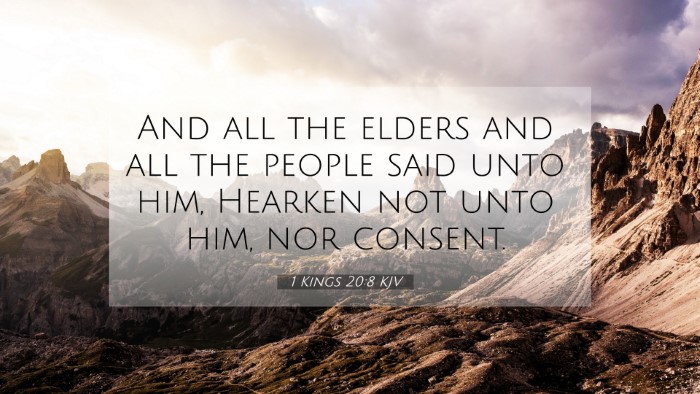Understanding 1 Kings 20:8
Verse Context: In 1 Kings 20:8, Ahab, the king of Israel, is faced with a decision regarding his impending conflict with Ben-Hadad of Syria. This verse captures the atmosphere of fear and the challenges that kingship in Israel posed during a time of formidable opposition.
Verse Text
"And all the elders and all the people said unto him, Hearken not unto him, nor consent." (1 Kings 20:8, KJV)
Verse Meaning and Interpretation
This verse serves as a crucial moment in the narrative where Ahab consults the elders and receives counsel about how to respond to the threats posed by Ben-Hadad. The implications of this verse reflect the broader themes of leadership, advice, rebellion, and the consequences of consent.
- Counsel of the Elders: Ahab's approach demonstrates the importance of seeking wise counsel, reflecting the Biblical principle of listening to experienced leaders in decision-making scenarios.
- Consequences of Consent: The elders' advice cautions against compromising with the enemy, suggesting that the resistance to evil is vital for maintaining the integrity of leadership and governance.
Cross References
This verse connects with several other Scripture references that illustrate themes of counsel, leadership, and moral standing:
- Proverbs 11:14: “Where no counsel is, the people fall: but in the multitude of counsellors there is safety.”
- 2 Chronicles 18:4: “And Jehoshaphat said unto the king of Israel, Enquire, I pray thee, at the word of the Lord today.” (a reminder of the need for divine counsel)
- Exodus 23:2: “Thou shalt not follow a multitude to do evil; neither shalt thou speak in a cause to decline after many to wrest judgment.”
- Proverbs 19:20: “Hear counsel, and receive instruction, that thou mayest be wise in thy latter end.”
- James 4:7: “Submit yourselves therefore to God. Resist the devil, and he will flee from you.” (emphasizing the necessity of resistance)
- 1 Timothy 1:18: “This charge I commit unto thee, son Timothy, according to the prophecies which went before on thee, that thou by them mightest war a good warfare.”
- Matthew 10:16: “Behold, I send you forth as sheep in the midst of wolves: be ye therefore wise as serpents, and harmless as doves.”
Thematic Connections
This verse’s themes encourage further exploration through a comparative Bible verse analysis:
- Leadership and Humility: The contrast of Ahab’s often impulsive decision-making against the wise counsel of elders provides a lens for understanding effective leadership (see also Proverbs 15:22).
- Resistance to Oppression: It evokes broader themes found in Biblical texts concerning resisting evil influences (e.g., Ephesians 6:13).
- The Role of Elders: Similar to the portrayal of elders in the New Testament (Titus 1:5), this narrative shows their critical and advisory role.
Inter-Biblical Dialogue
To enhance your understanding of Ahab's interaction with the elders, consider the following comparative analyses:
- Isaiah 30:1-2: Addresses the folly of seeking help from Egypt instead of God, paralleling the reliance on human counsel over divine guidance.
- The Pauline Epistles: Themes of authority and submission can be examined in the light of how churches were advised in 1 Timothy and Titus.
- The Prophets and Apostolic Teachings: Analyzing Elijah's confrontation of Ahab in 1 Kings 18 brings to light the moral and spiritual frameworks leaders faced.
Tools for Bible Cross-Referencing
Utilizing Bible cross-reference guides can enhance your study:
- Bible Concordances: Excellent resources for tracking themes and words to find related verses.
- Cross-reference Bible Study Methods: Practical methods can aid in exploring connections between scripture passages.
- Comprehensive Bible Cross-reference Materials: Seek out study materials focusing on key concepts across the Bible.
Conclusion
The interaction in 1 Kings 20:8 serves not only as a historical account but also as a guide for modern readers in their own search for wise counsel and understanding the importance of resisting evils. By establishing connections and engaging in scriptural cross-referencing, we can deepen our insights into the Word of God and understand how various scriptures complement one another.


